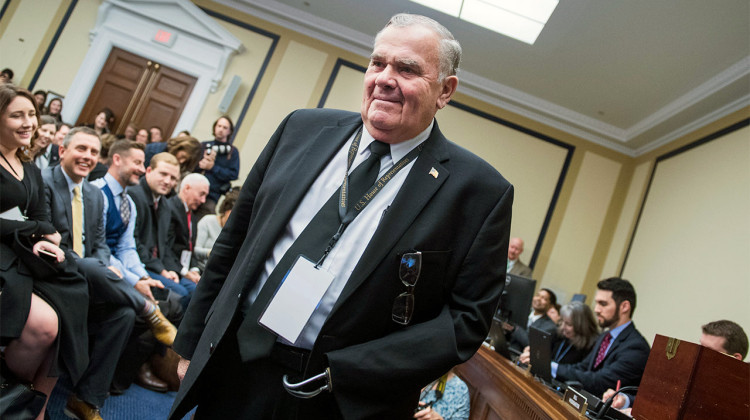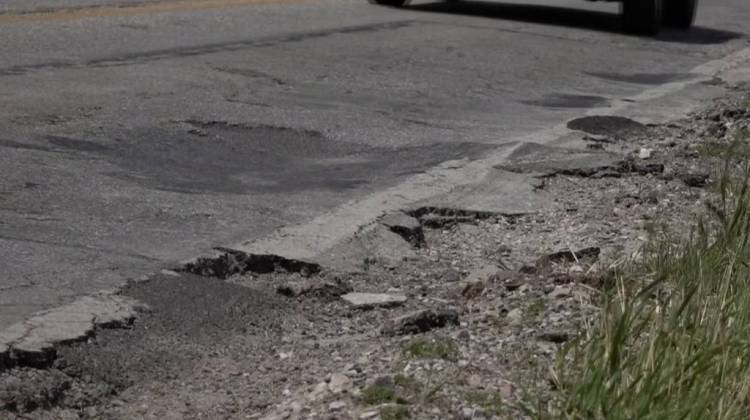Voters will decide the next mayor of Indianapolis on Nov. 5. Ahead of that decision, WFYI City Reporter Darian Benson spoke with candidates Democratic incumbent Joe Hogsett, Republican State Sen. Jim Merritt and Libertarian and automation engineer Douglas McNaughton about key election issues.
Libertarian Douglas McNaughton
On Food Insecurity:
"Food insecurities can be addressed in two ways and both of them involve the private sector. The first of all, we have an issue in Marion County with the zoning laws, especially in minority and poor income neighborhoods, to get the zoning variances necessary to open something as simple as a grocery store. The other thing we have is companies like Kroger who have addressed this issue in Louisville with pilot programs for mobile grocery stores. We need to get Kroger to introduce that program in Indianapolis as well."
On Homelessness:
“We can’t address poverty by ignoring it. We can’t address poverty by destroying homeless encampments. We can’t outlaw it. We need to have an outreach. Instead of doing what we have done for the past 16 years -- just finding homeless encampments and saying 'well you can’t be there, that’s a hazard' -- we need to set something up for these people to exist. If that involves the city purchasing property, if that involves more outreach out there to help these people, we need to help them and we need to have that path forward."
On Transportation:
"Everybody is looking backwards. The Red Line is a prime example. I was against the Red Line from the very beginning. Open it to competition. We need more private services to get involved. We need to have the ability for people to say, I can do it better. We need to offer them an opportunity to come in and prove that they can do it better."
On Crime:
"One of the things I have heard for 12 years is we need more cops. Police officers don’t prevent crime. Police officers catch criminals. Our jail is full, IMPD is really good at catching criminals. Laws don’t prevent crime. In fact, laws simply define what a crime is. So, the crime we have, the violent crime, is something outside of the police department. It's outside of laws. We already have laws against it. What we need to do is address the problem head on. This involves both youth outreach, which we have been doing to a point, but studies have been shown that the more money you can put on outreach, the better outcome you have.
The other thing is black market crime. The crime of organization, the crime of prohibition, literally. It's good to note, that after we had this forum and I made this point, they have actually decided to decriminalize, on the local level, small amounts of marijuana possession. And this will, in the longer term, reduce crime because prohibition has been shown, no matter what you’re prohibiting, it’s been shown to be the biggest push for organized crime in this country."
On Infrastructure:
"Currently, the way we fund the infrastructure is kind of odd. It goes by road miles, and not square footage of pavement. We build roads to one standard, and then we maintain them by a completely different standard. So that, cities that have a lot of rural roads get more money for per cost of the road than places like Indianapolis. What impacts roads, always is the commercial traffic. Which is why you see bridges that have weight limits, because they are not built to withstand more than a certain weight. So, the roads that are built heavier obviously take more money to build and yet, the state of Indiana distributes the money equally. That is something the mayor can only address by beating on the door of the legislature and saying you need to change this."
Republican Jim Merritt
On Food Insecurity:
"I think that the city of Indianapolis ought to look at a food TIF, a tax incremental financing district, where we can grow the amount of money that we have to incentivize Target, or Aldi or Koger's Ruler brand to come into these different communities. I think the idea of incentivizing bodegas to be on street corners and to be in communities. And, let’s just talk about food trucks. You have food trucks serving warm food downtown for the people that work downtown. Let’s talk about having semis of food in four or five different places in the city of Indianapolis for sale."
On Crime:
"We need better training for our police officers, we need better equipment for our police officers, and we need better recruitment of our police officers. They need absolutely need support from the mayor. The mayor has to be in the grass roots. I’ll have office hours. I’ll have mayor’s night out. We will have data collection meetings. I will know what is going on in the community, and that is a big part of crime prevention itself."
On His African American Agenda:
“We need a commission like the state of Indiana. I’m a state senator and we’ve had great success with the commission on African American males. I’m not sure that we need a commission on African males as much as we need a commission on African American lives. And it’s very important that we focus on the achievement gap between black and white and as what is happening in IPS Schools."
On Education:
“I’m pleased that half of the charter schools in the state of Indiana reside in Indianapolis. And I’m also pleased that the mayor of Indianapolis is in charge of them and sponsoring them. I have met with the IPS superintendent, and I asked her to be my partner in governance. And so, my plan is to be right in the middle of the education system in Indianapolis."
On Infrastructure:
“Everybody wants a nice street in their neighborhood, and our plan is to completely have a fresh analysis of all streets in Indianapolis. We will share that with the residents of Indianapolis and that openness is incredibly invaluable. And we will also establish a capital asset management plan so there’s not the problems we’ve had the last three winters."
Democrat Joe Hogsett
On Food Insecurity:
“We’ve worked very diligently to improve on and make more readily available what I call the 20th Century model of food access, which is brick and mortar. But when I say 20th Century model, I think it’s important for all of your listeners to understand and appreciate that there is a 21st Century model that really doesn’t involve brick and mortar supermarkets. It really becomes a neighborhood and a community focused issue of better access, more nutrition, higher degrees of awareness and levels of education. In this year’s 2020 operating budget, we have in that budget a line item that would be distributed to neighborhood and community groups that are working in areas that are food insecure. Find out what their unique issues are as it relates to access and then try to take advantage of that by using city funds to support what neighborhoods and communities are already doing to address the issue themselves."
On Crime:
"We by the end of this year will have added a net increase of 150 police officers in IMPD. We’ve been able to return to community-based, beat-oriented policing so that police officers can get out of their car, get to know their neighborhoods and become more involved. We also have increased funding for technology. And then most importantly, in this year the city of Indianapolis will probably spend close to $4 million in crime reduction, crime prevention and crime intervention programs in our neighborhoods to try and stop the gun violence before it actually occurs."
On Addressing Racial Disparity:
"Well we’re doing that, I think in very, in many meaningful ways. For example, our summer jobs program that is now four years running, Project Indy. Indy Achieves, a program that has just fully been launched this year, that provides scholarship grants and completion grants. And, those are just two examples of programs that are designed to help our young people throughout Marion County. But, I want to be the kind of mayor who is real and who is present in the community listening to the leadership, listening very carefully to the challenges. And then go back after I have listened and try to craft policies that address those challenges."
On Redevelopment:
"Yeah, I think the best way to keep homeowners in their homes, is to make sure that they can continue to afford owning their home. And so, our neighborhood development strategies have always kept in mind the importance of multigenerational families that have called those neighborhoods their home. When a developer comes to us and asks for city incentives, we ask that developer to minimally, in the development, set a aside a certain percentage of units or homes for below market rate or more affordable housing options for more people so they are not priced out of the neighborhood."
 DONATE
DONATE








 Support WFYI. We can't do it without you.
Support WFYI. We can't do it without you.